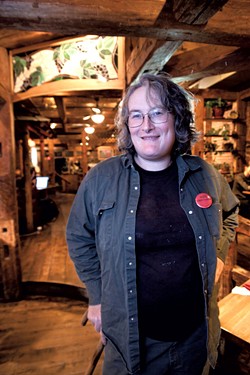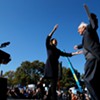Published September 24, 2014 at 10:00 a.m.
Can a political party be venerable without being successful? Consider the case of Vermont's Liberty Union Party.
Founded in 1970, the uniquely Vermont party that stakes out positions on the far-left edge of the political spectrum has no discernible impact on state or local elections. Yet its place in political history is secure. Sen. Bernie Sanders got his start on the Liberty Union ticket. He ran twice for both U.S. Senate and governor before he shed the only party affiliation he ever had — and started winning.
In the intervening decades, the Liberty Union Party has kept fielding candidates who espouse the ideals of the 1960s movements for civil rights and women's liberation and against capitalism and all U.S. military intervention overseas. Its best-ever statewide election result was just two years ago, when Mary Alice Herbert racked up 13 percent of the vote in the race for secretary of state. It helped that Vermonters opposed to incumbent Jim Condos had no alternative on the ballot other than Herbert. Condos ran with the tripartisan endorsement of the Democratic, Republican and Progressive parties.
Losing hasn't deterred Herbert — or the other nine Liberty Union candidates for governor, lieutenant governor, treasurer, attorney general, U.S. House, state senate and sheriff on the ballot this November.
But a couple of party members have been successful in winning minor local posts, notes Liberty Union's curmudgeon-in-chief, Peter Diamondstone. One of the faithful was chosen in the early 1980s as a representative to Brattleboro's Town Meeting, and Westminster voters installed another Liberty Unionist as justice of the peace around the same time.
Apart from those showings, the party receives a negligible number of votes in each of the campaigns it wages every election year for local, state and federal offices. But finishing first has never been the aim of this small Vermont band of true believers.
Matthew Andrews, a Plainfield masonry contractor who has worked as a labor organizer, says he views his campaign for Vermont's sole U.S. House seat as "a means of expressing activism." For Liberty Union, he adds, "Winning elections isn't as important as winning the debate of ideas. The party has a message that deserves to be heard, and we work to get it out there."
But with virtually no campaign money, Liberty Union candidates have little ability to reach Vermonters with a message that Diamondstone defines as "nonviolent revolutionary socialism." Unable to invest in old-fashioned political paraphernalia such as bumper stickers and lawn signs — let alone network television ads or blurbs on popular websites — the party's nominees rely on public-access TV forums and other no-cost means of gaining exposure, such as candidate debates.
But some debate sponsors don't invite Liberty Union candidates to take part. And some of the party's candidates appear uninterested in debating their opponents. Marina Brown, who's seeking the office of lieutenant governor, says she doesn't know the date or location of the next scheduled face-off in the closely watched race featuring Republican incumbent Phil Scott and Progressive/Democratic challenger Dean Corren.
Diamondstone was not so nonchalant when he was excluded from a candidate forum many years ago. Garrison Nelson, who's been teaching political science at the University of Vermont for 46 years, says he recalls Diamondstone once pounding on a studio door and screaming to be admitted.
Hitting up potential donors isn't just difficult for a party calling for the overthrow of capitalism — it's an activity to be scorned, in the view of Liberty Union candidates such as V. Murray Ngoima. To solicit funding is to become beholden to donors, reasons Ngoima, who — perhaps ironically, given her attitude toward finance — is on the ballot for state treasurer. Besides, notes the art teacher at the Alliance for the Visual Arts in Lebanon, N.H., "My priority isn't to keep a campaign afloat; it's to keep myself afloat."
Some Liberty Union veterans also lack the physical capacity to campaign for office. "There's been a lot of health problems," notes Brown, who, at age 49, would qualify as a member of the party's youth wing.
Diamondstone, who says he'll turn 80 in December "if I make it," has limited mobility due to leg and heart problems. He agreed to run for governor because "nobody else was willing to do it," although, he adds, "I'm not really running, you know."
Rosemarie Jackowski, 77, plans to rely more on blogging than on door knocking in her bid for attorney general.
Herbert, the biggest vote-getter in Liberty Union history, is again seeking the secretary of state post, in her 79th year.
And Jerry Levy, another septuagenarian, has carried the Liberty Union banner in many election campaigns, including this year in the Windham County state senate contest.
Will the party survive the passing of its elders? "I do think it will go on," says U.S. House hopeful Andrews, 33, who says he became interested in Liberty Union's brand of politics while in high school.
Diamondstone, who helped inspire Andrews to join the party, agrees that Liberty Union will remain a presence in Vermont. "Nobody else is going to carry Liberty Union's message, and there's always going to be a need for that message," Diamondstone says.
Even if it does disappear, the party will merit at least a lengthy footnote in the annals of state politics for having served as the launching pad for Sanders' ascent into the political stratosphere.
The future U.S. senator joined the party the year after it was formed in June 1970 at a meeting in the West Rupert home of William Meyer, who had served one term in the U.S. House, from 1959 to 1961. A champion of progressive causes, Meyer had been the first Democrat to win a statewide election in Vermont in more than a century. But he had come to regard the Democratic Party as too conservative and was seeking to organize a leftist alternative.
As a Liberty Union candidate, Sanders maxed out at 6 percent of the vote, but he flashed the charisma that later convinced Burlingtonians to elect him to be their mayor in 1981 and is now propelling him toward a bid for the presidency.
"Bernie was quite the orator, right from the beginning," Diamondstone recalls. In a phone interview last week, the Liberty Union leader described Sanders as "a unique political figure — there's no question about it."
The two have similar backgrounds as socialists who grew up in Jewish households in New York City, attended the University of Chicago and migrated to Vermont within three years of one another. Diamondstone and Sanders were friends as well as comrades for many years. But "like brothers, we didn't get along," Diamondstone notes.
In Sanders' view, there did not need to be a contradiction between adhering to socialist ideology and winning elected office in Vermont. To Diamondstone, there is never sufficient reason to compromise political principles in pursuit of votes.
After repeatedly running and losing as a Liberty Unionist, Sanders sought to disband the party in 1977 on the grounds that it had served its purpose, Diamondstone says. Sanders failed in that effort, so in 1979 he resigned from the party.
"Bernie left Liberty Union because he wanted to win," longtime party member Ngoima says.
In addition, observes UVM's Nelson, "Peter [Diamondstone] undermined his own party by imposing a party line, and nobody tells Bernie what to say or believe."
Martha Abbott, a Progressive who recently stepped down as that party's chairwoman, had attended Liberty Union's founding meeting and broke from its ranks at around the same time as Sanders — and for same reason, according to Abbott. (Sanders declined through his Washington, D.C., spokesman to be interviewed for this story.)
"I joined Liberty Union mainly because of opposition to the war [in Vietnam] and because I wanted an alternative to the Democratic Party and the Republican Party," Abbott remembers. And she was impressed at that initial meeting by "people who were pretty smart and articulate and who were presenting an appealing vision." Abbott came to identify so strongly with the party that she ran as its gubernatorial candidate in 1974.
But Liberty Union was falling into the trap that ensnares almost all third parties, she adds. "They wanted to develop a perfect position on every issue rather than speaking to the concerns of ordinary Vermonters." Abbott went on to align with the Progressives because, in her view, that party does not elevate ideological purity over electoral viability.
The decisive split between Diamondstone and Sanders came in 1984 over the issue of socialists' relationship with the Democratic Party. Then in his second term as mayor of Burlington, Sanders was campaigning vigorously in support of the Democrats' presidential nominee, Walter Mondale. "That broke it," Diamondstone says. Voting for a capitalist party was one thing; publicly urging others to do so was, to Diamondstone, a step too far.
Liberty Union is not an Orwellian right-think organization, its members object. "It's not a requirement that we all march in lockstep," says Jackowski, the party's current candidate for attorney general. She notes that she opposes abortion "in pretty much all instances," as well as physician-assisted suicide, on the grounds that "all life is sacred." Liberty Union's platform, in contrast, advocates that "everyone's rights of choice and privacy be totally free of government restriction."
The party can also be seen as more utopian than socialist, more anarchic than Leninist. Its platform calls for free health care and education from birth to death for everybody in the United States. And when Liberty Union deliberates on issues, "the one rule we follow is that we don't follow Robert's Rules," Diamondstone says, referring to the standard procedure for debate.
But Liberty Union does refuse to dilute its commitment to revolutionary politics. In that way, it differentiates itself sharply from the Progressives, whom Liberty Unionists see as increasingly indistinguishable from Democrats.
Jackowski is especially rankled by Abbott's move in 2010 to first accept the Progressives' nomination for governor in order to protect the party's ballot line and to then decline the nomination so as not to draw votes from Democratic candidate Peter Shumlin. "That was an unethical thing to do and disrespectful of voters," Jackowski says. "It was a way of manipulating the electorate."
Ngoima adds that, like the Democrats, the Progressives won't discuss subjects that "the party hasn't vetted." And the two parties now seldom run candidates in opposition to one another, she notes. The similarity between their stands on many issues "narrows the debate," Ngoima says. "The Progressive Party's policy of not splitting the vote goes against the interests of democracy."
To UVM's Nelson, Liberty Union looks like a party of prophetic pioneers who, 44 years ago, launched a left-wing movement in a state that was then overwhelmingly Republican. Liberty Union might in this way be seen as an antecedent to Vermont's Progressives, who style themselves as the most successful third party in the United States. But Nelson is less favorable in his overall appraisal of Liberty Union.
"They played a significant symbolic role," he says, "but not a substantive one."
The original print version of this article was headlined "Liberty Union Party Stays True to Its Ideals — and Keeps Losing"
More By This Author
About the Artist

Matthew Thorsen
Bio:
Matthew Thorsen was a photographer for Seven Days 1995-2018. Read all about his life and work here.
Matthew Thorsen was a photographer for Seven Days 1995-2018. Read all about his life and work here.
Speaking of...
-

Vermont Senate Votes Down Ed Secretary Nominee Zoie Saunders
Apr 30, 2024 -

Court Rejects Roxbury's Request to Block School Budget Vote
Apr 24, 2024 -

Q&A: Downtown Montpelier Transforms Into PoemCity Every April
Apr 24, 2024 -

Video: Visiting the Kellogg-Hubbard Library’s PoemCity in Montpelier During the Month of April
Apr 18, 2024 -

Q&A: Catching Up With the Champlain Valley Quilt Guild
Apr 10, 2024 - More »
Comments (4)
Showing 1-4 of 4
Comments are closed.
From 2014-2020, Seven Days allowed readers to comment on all stories posted on our website. While we've appreciated the suggestions and insights, right now Seven Days is prioritizing our core mission — producing high-quality, responsible local journalism — over moderating online debates between readers.
To criticize, correct or praise our reporting, please send us a letter to the editor or send us a tip. We’ll check it out and report the results.
Online comments may return when we have better tech tools for managing them. Thanks for reading.















































